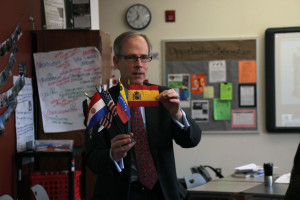
BY RACHEL PAGE
PHOTO BY CARL STEWART
Mark Davidson stands by the whiteboard with a green dry erase marker in his hands. He has just finished writing the words “Embassy,” “Department of State,” and “Consulate,” on the board, vocabulary terms for the lecture he is about to give. Davidson is a member of the U.S. State Department who has been invited to talk at Wilson as part of the WISP Guest Speaker Series, organized by the Wilson International Studies Program academy and its head, Julie Caccamise. He is also a Wilson parent; his daughter Akari sits at the back of the classroom, talking with friends and waiting for her father to begin.
“Good morning,” Davidson greets the students. “Buenos días. Bonjour. Guten tag.” His impressive language skills, he explains, are one of the benefits of a job with the state department. During his career, he’s had the opportunity to travel to Venezuela, Spain, Japan, Paraguay, and Pakistan. But DC, he says with a laugh, is “the most exotic, difficult to work in place” he’s ever visited.
Davidson gives off the impression of a worldly traveler, but he assures his audience that he hasn’t always been this way. Growing up in Rhode Island, he had little direct exposure to the outside world; he didn’t travel outside of the United States until he was 20 years old and in college.
As a sophomore in high school, Davidson met a German exchange student whose questions about American culture and willingness to talk about his home country sparked his own interest in cultural diplomacy. “It seemed, to use a Rhode Island expression, wicked awesome to be able to travel and learn about people in other countries and teach them about the United States,” he says.
After studying abroad in college and working for a brief time in New York, Davidson decided to take the Foreign Service Officer Test to join the State Department as a diplomat. He passed with flying colors. Since then, he has worked in various diplomatic positions around the world. His expertise is in the area of public diplomacy, which centers around cultural exchange through education and dialogue.
“You have to appreciate the art, the music, the food, the culture, so you can truly be a bridge between two countries,” says Davidson.
To demonstrate what he means, he holds up a red rug decorated with pictures of tanks and helicopters on top of a fragmented map– a “war rug” he got from a friend in Afghanistan while working at the embassy in Pakistan. This, he says, is an example of something that is hard to understand until you actually visit a country: the ways that U.S. international actions have affected it, and the ways in which these interventions too become intertwined with the unique culture, the war in Afghanistan incorporated into the ages-old tradition of rug making in Central Asia.
“When you think of twenty-first century international relations, it seems very official, like people in suits and ties,” says Davidson. “But relations between countries are just relations between people.”
When Davidson asks his audience who wants to be a diplomat, only a few reluctant hands go up. Davidson continues as if he’s been expecting it. He loves his job, he explains, and it’s given his daughters a level of cultural literacy and enrichment that he doubts they could have acquired through any other means. But being a diplomat also means traveling from country to country, which can be hard for a family.
Davidson ends by describing some of the ways that Wilson students can get involved in international relations. The State Department offers a variety of opportunities for young diplomats, including summer internships at embassies and multiple exchange programs that allow high school students to spend summers and semesters abroad across the globe.
Even though it comes with its challenges, Davidson feels that working for the State Department is worth it. “I feel extremely happy every day to do the kind of work I do,” he says.